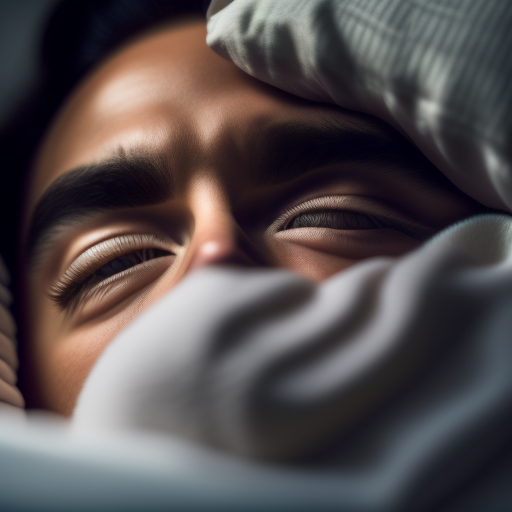The Relationship between Insomnia and Anxiety: Understanding the Connection


Introduction
Sleep and anxiety are essential components of our lives. Sleep is necessary for the body to function correctly, while anxiety is a natural response to stress. When these two factors are disrupted, it can lead to various health issues, including insomnia and anxiety disorders. In this article, we will explore the relationship between insomnia and anxiety, the impact of anxiety and primary insomnia in a patient, connections between stress and insomnia, the difference between anxiety and insomnia, and treatment options for insomnia and anxiety.
Understanding Insomnia and Anxiety
Insomnia is a sleep disorder characterized by difficulty falling asleep, staying asleep, or waking up too early. Anxiety, on the other hand, is a feeling of unease, such as worry or fear, that can be mild or severe. These two conditions are interrelated, and research shows that people with anxiety disorders are more likely to have insomnia than those without anxiety. According to the Anxiety and Depression Association of America, 50% to 80% of people with anxiety disorders experience sleep problems.
The Relationship of Sleep and Anxiety in Anxious Subjects
The relationship between sleep and anxiety is complex, and it works both ways. Anxiety can cause insomnia, while insomnia can worsen anxiety. People with anxiety may have difficulty falling asleep due to racing thoughts and worries, leading to a lack of sleep. The lack of sleep, in turn, can make anxiety symptoms worse, creating a vicious cycle.
How Anxiety and Primary Insomnia Interact in a Patient
Primary insomnia is a sleep disorder that is not caused by any other medical, psychiatric, or environmental factors. In patients with primary insomnia and anxiety disorders, the two conditions can interact with each other, creating a challenging situation for the patient. Anxiety can worsen insomnia, leading to more anxiety, and so on. This interaction can lead to a major depressive disorder, further complicating the treatment of both disorders.
Connections between Stress and Insomnia
Stress is a significant contributor to insomnia and anxiety. When the body experiences stress, it produces cortisol, which can disrupt sleep. Stress can also cause anxiety, leading to more difficulty sleeping. Managing stress can help improve sleep and reduce anxiety symptoms. Stress management techniques include meditation, yoga, exercise, and therapy.
The Difference between Anxiety and Insomnia
Anxiety and insomnia are two different conditions that are often interconnected. Anxiety is a feeling of worry or fear, while insomnia is a sleep disorder that affects a person’s ability to fall asleep or stay asleep. While anxiety can cause insomnia, it is possible to have insomnia without anxiety. It is important to understand the differences between the two conditions to seek appropriate treatment.
Treatment Options for Insomnia and Anxiety
Treatment options for insomnia and anxiety include therapy, pharmaceutical drugs, and alternative treatments. Therapy can help patients understand their thoughts and behaviors that contribute to anxiety and insomnia. Pharmaceutical drugs, such as antidepressants and sleep aids, can be effective for treating anxiety and insomnia, but they should be used with caution and under the guidance of a healthcare professional. Alternative treatments, such as meditation, yoga, and acupuncture, can also help improve sleep and reduce anxiety.
Conclusion
Insomnia and anxiety are two significant health issues that can have a significant impact on a person’s quality of life. Understanding the relationship between the two conditions and seeking appropriate treatment is essential to manage both. If you are struggling with insomnia or anxiety, seek professional help from a healthcare provider to find the best treatment options for your specific situation. Remember, sleep is vital for your overall health and well-being, so prioritize your sleep hygiene and seek help if you are experiencing difficulties sleeping.
Here are some supplements that can help you:
The Stop Snoring and Sleep Apnea Program — Say goodbye to snoring and hello to restful sleep with The Stop Snoring and Sleep Apnea Program — the proven solution to help you sleep better tonight.
Discover How to Get the Deep Restorative Sleep You Need — Discover the secrets to achieving deep, rejuvenating sleep with our comprehensive guide — Discover How to Get the Deep Restorative Sleep You Need and wake up refreshed every morning.
Natural Insomnia Program — Blue Heron Health News — Tossing and turning at night? The Natural Insomnia Program from Blue Heron Health News provides a natural approach to help you get the restful sleep you need to feel your best.
7 Day Mind Balancing Plan — Transform your life in just 7 days with the powerful Mind Balancing Plan — Awaken your inner potential and attract love and success with ease.
Comments
Post a Comment